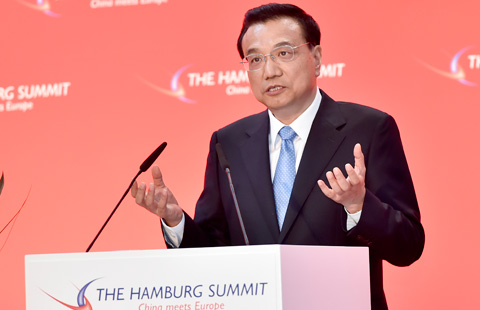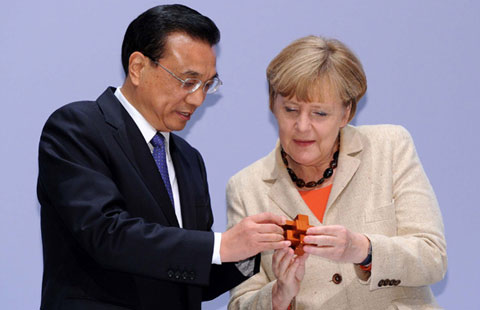China needs more than GDP
Updated: 2014-10-10 13:10
By Chen Longxiang in Beijing(China Daily USA)
|
||||||||
Since China surpassed Japan as the world's second-largest economy in 2010, the world has been counting down to the day when it will outpace the United States as the world's leading economic power.
In April, the World Bank's International Comparison Program said that China is poised to overtake the US as the world's biggest economy earlier than expected, possibly as soon as this year, using calculations that are based on so-called purchasing power parity (PPP).
That prediction has come true. According to the International Monetary Fund's latest World Economic Outlook, China's GDP is worth $17.6 trillion, while US GDP is $17.4 trillion, with adjustments made for China's low cost of living.
A PPP exchange rate is based on figuring out the "purchasing power" of a currency in terms of what that currency can buy. As an unconventional statistical method, PPP measurement remains a controversial way in ranking economies.
Jeffrey Frankel, a professor at Harvard University's Kennedy School of Government, writes in a thoughtful paper that the reports trumpeting that China is to overtake the US as the world's top economic power are misleading because comparing countries' GDPs using PPP rates, rather than actual exchange rates, is the right thing to do if you want to measure people's living standards. But it is the wrong thing to do if you are looking at national income to measure the country's weight in the global economy.
"Choosing the PPP model seems fair, but in the process of accounting something has been exaggerated. They actually are making news," said Di Dongsheng, deputy director of the Center for Foreign Strategy Studies of Renmin University of China.
"The PPP-approach only produces an index on paper, which can reflect some changes, but there is no need to take it too seriously," said Mei Xinyu, a researcher at the International Trade and Economic Cooperation Institute, affiliated to the Ministry of Commerce.
"Whether the renminbi is overvalued is still controversial, but what is certain is that no matter which measure is used, GDP only reflects a country's economic increment and does not represent the true wealth," Di said.
"We can see from GDP data how much economic activity occurred in a year, but GDP cannot show who really benefited from that economic activity."
"GDP data can show the size of China's economy, but the happiness index of the Chinese people is not included as much in the profits created painstakingly by Chinese workers which flew into Americans' wallets. From this perspective, the IMF data showing China's economic strength has small practical significance," Di said.
"Even if China's economy surpassed the US in size in one key measure, the US' control of the global economy and finance is still unshakable," Mei said.
"Although China has caught up with some advanced economies on major economic indicators, there are still great challenges in pushing forward domestic economic and social development," he said. "Besides, undertaking more international responsibility currently, China should still focus on economic transformation, overall sustainability and well-being of people."
chenlongxiang@chinadaily.com.cn

 Li says focus is on long-term growth
Li says focus is on long-term growth
 Hollande meets with Arnold Schwarzenegger in Paris
Hollande meets with Arnold Schwarzenegger in Paris
 Air China's first Boeing 747-8 set to take off
Air China's first Boeing 747-8 set to take off
 Malala's hometown celebrates her Nobel Peace Prize
Malala's hometown celebrates her Nobel Peace Prize
 Hello Kitty, happy 40th birthday!
Hello Kitty, happy 40th birthday!
 Li pins high hopes on China-Germany cooperation
Li pins high hopes on China-Germany cooperation
 Call of the wild
Call of the wild
 China's trade with Texas taking off
China's trade with Texas taking off
Most Viewed
Editor's Picks

|

|

|

|

|

|
Today's Top News
China faces risks in Brazil's energy sector
Premier hails Hamburg's role in cooperation
Premier's visit takes China-Germany ties to new height
Li says focus is on long-term growth
China plans panda park
Former senior CPC official in Jiangsu under probe
China needs more than GDP
Sino-US trade ties are assured
US Weekly

|

|







